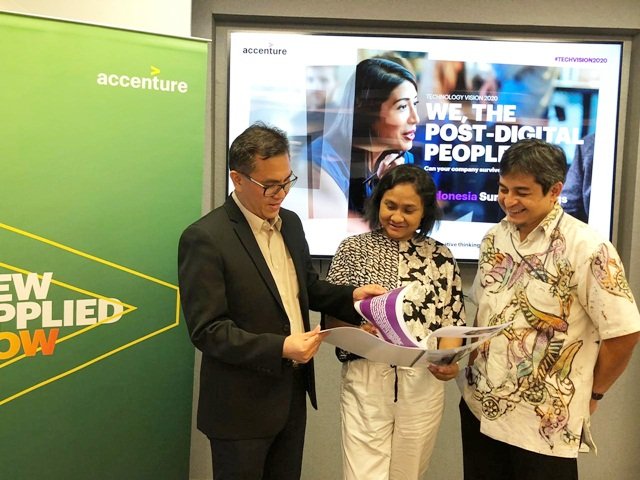Predicts 5 IT Trends (ATV) 2020
Predicts some key technology trends that will reorganize businesses over the next three years. At least there are five main trends that must be considered by companies to defuse technology clashes and realize new forms of business value to trust (trust), to compete and achieve success in a digital world.

Image Source
Accenture Technology Vision 2020, which is the 20th edition of Accenture (NYSE: ACN) annual report, predicts key technology trends that will reorganize businesses over the next three years. According to a report titled "We, Humans in the Post-Digital Era: Can your company survive the 'tech-clash'?" failure.
From a survey conducted by Accenture for the Technology Vision report on more than 6,000 business and IT executives worldwide, 83% recognize that technology has become an inseparable part of human experience. -"Even in Indonesia, 97% of executives agree on the importance of the relationship,"
In addition, because they were fascinated by the promise of technology, many organizations created digital products and services solely because they could do so, without fully considering human, organizational and social consequences. "Today we see a technology clash caused by consumer expectations, technological potential, and business ambitions - and now we are at a point where leadership change is important.
Many companies have to change their mindset by reviewing fundamental business models and technologies and creating new bases of competition and growth, "he said.
Based on the Technology Vision report, continuing use of the current model - without thinking about the need for innovation - not only risks disrupting customers or disconnecting employee involvement, but can also permanently limit the potential for renewal and future growth. However, tech-clash is a challenge that can be overcome.
Technology Vision identifies five key trends companies must consider over the next three years to defuse technology clashes and realize new forms of business value that are partly driven by strong and trusting relationships with stakeholders:
The Importance of Personalizing Experience . Organizations need to design personalized experiences that strengthen one's activities and choices. This can turn passive users into active ones by transforming one-way experiences, which can make people feel they have no control over the choices that exist and are not involved into a true collaboration. Five of the six business and IT executives surveyed (85%), in Indonesia (92%), believe that the success of competition in this new decade requires organizations to improve their relationships with customers, making them partners.
AI and me. Artificial Intelligence (AI) must contribute to the way humans do their work, not just support automation. As AI capabilities grow, companies must rethink the work they do to make AI a generative part of the work process, with trust and transparency at the core. At present, only 37% of organizations, 47% in Indonesia, report the use of inclusive designs or human-centered design principles to support collaboration between humans and machines.
Intelligence Dilemma. Assumptions about who is the owner of a product are being challenged in a world that is entering a "stagnant beta phase." As companies try to introduce a new generation of products driven by digital experience, the handling of this new thing becomes very important in supporting success. Nearly three-quarters (74%) of executives, while in Indonesia 82%, report that products and services connected to their organizations will have more or far more updates over the next three years.
Outdoor Robots. Robotics is no longer confined to warehouses or factories. With 5G ready to significantly accelerate the growth of trends, every company must rethink its future through a robotics lens. Executive views on how their employees will embrace split robotics: 45% say that their employees will feel challenged in finding ways to work with robots, while 55% believe that their employees will easily find ways to work with robots. In Indonesia it is different, because (82%) believe that their industry needs robots in the open air.
DNA Innovation . Companies have access to a large number of disruptive technologies that have never existed before, such as distributed ledgers, AI, extended reality, and quantum computing. To manage it all, organizations need to create their own unique innovation DNA while developing at the pace demanded by the market today. Three-quarters (76%), in Indonesia 83%, executives believe that the need for innovation has never been this high. Therefore, to do it "right", new ways to innovate with ecosystem partners and organizations from third parties are needed.
Disrupts have been able to overcome the gap between human expectations and current standards. For example, the startup company Inrupt is working on a data linking architecture called Solid. It is designed to give humans greater control over their personal information by enabling them to store and use their data across the web through several "pods".
Humans can decide where their pods will be hosted and determine which companies or machines can access them and revoke or delete their information at any time. All of this was designed to catalyze Tim Berners-Lee's original vision, one of the founders of Inrupt, to have a web of opportunities for everyone. This is one type of human-centered approach that will determine who will be the leading organization in the future.
Note
I am not a technology observer, these posts are only intended to share information only.
Hi! Did you know that steemit.com is now censoring users and posts based on their opinions?
All the posts of these users are gone!
https://github.com/steemit/condenser/commit/3394af78127bdd8d037c2d49983b7b9491397296
Here's a list of some banned users:
'roelandp', 'blocktrades', 'anyx', 'ausbitbank', 'gtg', 'themarkymark', 'lukestokes.mhth', 'netuoso', 'innerhive'See anyone you recognize? There could be more, they also have a remote IP ban list.
Will you be censored next?